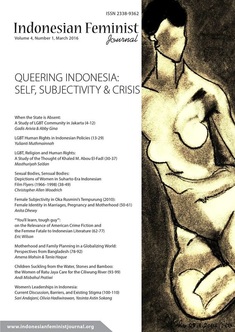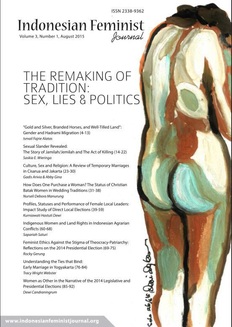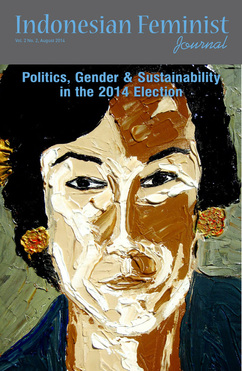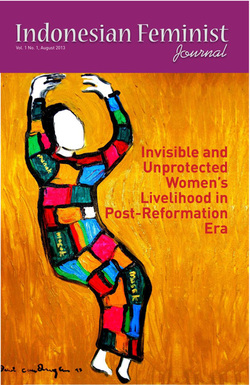INDONESIAN FEMINIST JOURNAL
IFJ Vol.4 No.1, March 2016 |

Feminism gives hymn of equality the power and the incentive to emancipate humanity. Originally this fight embraces the cause of women’s liberation in full which still unachieved in recent years. Those experiences defend a specific understanding of philosophy as social critique. It owes its conceptual tools from the long struggle against racism and the history of slavery. In Indonesia, the tradition of phenomenology explores women’s experiences facing state violence as well as society’s unjust treatment against LGBT’s voices. The relationship between language and linguistic meaning as cultural marker has sharpened the way state and society rejected equality. Indonesia fails to think of history of transgendering, of Srikandi’s transgendering in Mahabharata epic. Or the ritual role of Banyuwangi transgendered males.
Free Access:
Free Access:
- Editorial Queering Indonesia! Self, Subjectivity & Crisis (Dewi Candraningrum)
- When the State is Absent: A Study of LGBT Community in Jakarta (Gadis Arivia & Abby Gina)
- LGBT Human Rights in Indonesian Policies (Yulianti Muthmainnah)
- LGBT, Religion and Human Rights: A Study of the Thought of Khaled M. Abou El-Fadl (Masthuriyah Sa’dan)
- Sexual Bodies, Sensual Bodies: Depictions of Women in Suharto-Era Indonesian Film Flyers (1966–1998) (Christopher Allen Woodrich)
- Female Subjectivity in Oka Rusmini’s Tempurung (2010): Female Identity in Marriages, Pregnancy and Motherhood (Anita Dhewy)
- ‘“You’ll learn, tough guy”’: on the Relevance of American Crime Fiction and the Femme Fatale to Indonesian Literature (Eric Wilson)
- Motherhood and Family Planning in a Globalizing World: Perspectives from Bangladesh (Amena Mohsin & Tania Haque)
- Children Suckling from the Water, Stones and Bamboo: the Women of Ratu Jaya Care for the Ciliwung River (Andi Misbahul Pratiwi)
- Women’s Leaderships in Indonesia: Current Discussion, Barriers, and Existing Stigma (Sari Andajani, Olivia Hadiwirawan, Yasinta Astin Sokang)
IFJ Vol.3, No.1, August 2015 |

This third issue of IFJ presents a broad array of the work of several feminist thinkers interested in the impact of cultural traditions of Indonesia on the lives of women. Using a large variety of sources, the first several articles cover the wider social context of such cultural traditions, while the second part zooms in on the operation of government and its electoral systems. We show that challenges to remaking of traditions revolve around sex, lies and politics. Following official statements, biographies and films, Saskia Wieringa confronts political silence investigating manipulation of traditional concepts of gender and sexuality in the 1965 Indonesian genocide during incorporation of Suharto ́s militarist regime. Immersing himself in a tale of a Hadrami migrant on a way from Yemen to Southeast Asia, Ismail Fajrie Alatas illustrates an example of a literary expression looking to curb femininity and masculinity reconfigurations sprouting from migration.
Free Access:
Free Access:
- Editorial-The Remaking of Tradition: Sex, Lies & Politics (Dewi Candraningrum & Lea Šimek)
- “Gold and Silver, Branded Horses, and Well-Tilled Land”: Gender and Hadrami Migration (Ismail Fajrie Alatas)
- Sexual Slander Revealed: The Story of Jamilah/Jemilah and The Act of Killing (Saskia E. Wieringa)
- Culture, Sex and Religion: A Review of Temporary Marriages in Cisarua and Jakarta (Gadis Arivia & Abby Gina)
- How Does One Purchase a Woman? The Status of Christian Batak Women in Wedding Traditions (Nurseli Debora Manurung)
- Profiles, Statuses and Performance of Female Local Leaders: Impact Study of Direct Local Elections (Kurniawati Hastuti Dewi)
- Indigenous Women and Land Rights in Indonesian Agrarian Conflicts (Sapariah Saturi)
- Feminist Ethics Against the Stigma of Theocracy-Patriarchy: Reflections on the 2014 Presidential Election (Rocky Gerung)
- Understanding the Ties that Bind: Early Marriage in Yogyakarta (Tracy Wright Webster)
- Women as Other in the Narrative of the 2014 Legislative and Presidential Elections (Dewi Candraningrum)
IFJ Vol. 2 No. 1, August 2014 |

In this second edition, IFJ presents a wide sampling of the work of several of Indonesia’s feminist thinkers on national governance. National governance is the sum of the informal and formal values, norms, procedures, and institutions, that help stakeholders to identify, understand, and address national problems. This issue will address the degree of order, stability and predictability of the reformation era under SBY presidency: how is Indonesia governed in the absence of gender perspectives? How does this system engage with our existential problems such as climate change, natural & human-made disasters, economic gaps & dispossessions? IFJ seeks to answer such questions entailing the Indonesia general election in April and presidential election in July 2014.
Free Access:
Free Access:
- Preface
- Female Politicians in Political Parties of 2014 Election: Descriptive Representation vs. Substantive Representation (Nuri Soeseno)
- The Islamic-Political Genealogy of Fatayat in Soekarno and Soehato Era: A Feminist Perspective on the History of Organization (Nihayatul Wafiroh)
- Filmic Technology in TV News and the Construction of Monstrous Feminine (Ratna Noviani)
- The Disaster of Development: How Women’s “Empowerment” Projects are Damaging Indonesian Smallholder Farming, Rural Families, and the Environment (Laine Berman, PhD)
- Protecting Women’s Domestic Area & Environment: Study on Eco-friendly Batik (Arianti Ina Restiani Hunga)
- Women’s Resistance in Cotton Industry: Study on Environmental Degradation in East Sumba (Rambu Luba Kata Respati Nugrohowardhani)
- Research-Faces of Female Parliament Candidates in 2014 General Election (Elisabeth Anita Dhewy Haryono)
- Interview-Jeffrey Winters: The Importance of Nation’s Intervention to Female Politician Quota (Dewi Candraningrum)
- Profile-Binny Bintarti Buchori: How should Politics Work? (Mariana Amiruddin)
- Book Review-Obstacles to Women’s Political Independence (Astuti Parengkuh)
- Short Story-Snow Red (Intan Paramaditha)
- Poetry-Archive Drama (Afrizal Malna’s Poetry)
IFJ Vol. 1 No. 1, August 2013 |

The Indonesian Feminist Journal (IFJ) is the English edition of Jurnal Perempuan (JP), Indonesian's first feminist journal, which began publication in 1996. In this first edition, IFJ presents a wide sampling of the work of several of Indonesia's feminist thinkers. Debate on feminism and the feminist perspective in Indonesian society has flourished during the Reformation Era, interwined with broader issues of democracy and justice. Over the years of Reformation gender issues have been openly debated in the context of widening and deepening democracy in Indonesia. This edition features a cluster of writings on the topic of gender and corruption, which is a recent focus of feminist scholarship in Indonesia. IFJ brings out the flavor of many Indonesian poets and writers, many of them increased social awareness and self realization. These are feminist who claimed their place in society and political reality. We consider their expressions as a movement in Indonesian society.
Free Access:
Free Access:
- If We Are Victims (Kristi Poerwandari)
- Law Does Not Work for Women (Sulistyowati Irianto)
- Women and Family Welfare in Indonesia: A Critique of the Family Model “Man as the Breadwinner” (Atnike Nova Sigiro)
- Women Alienation from Job: Husband-Wife Partnerships in Household Financial Management (Leli Ruspita)
- Unraveling Corruption Practices in Placement of Migrant Domestic Workers Abroad (Anis Hidayah)
- Gender and Corruption: Finding Common Ground between the Anti-Corruption Movement and Women’s Movement (Danang Widoyoko)
- Media Analysis Blame the Rapist, Not the Victims: Monitoring Indonesian News Media (Mariana Amiruddin)
- Interview with Sri Mulyani on Gender and Women Leadership: “We Never Stop Loving Our Country” (Gadis Arivia)
- Profile-Tri Mumpuni: Helping Village Women with Electricity (Mariana Amiruddin)
- Review-Beyond Patriarchal Biases in Economics (Dewi Candraningrum)
- Short Story-Kaplug (Oka Rusmini)
- Poetry-The Maiden’s Prayer (Soe Tjen Marching)
- Poetry-O, Soul Called Holy (Zubaidah Djohar)